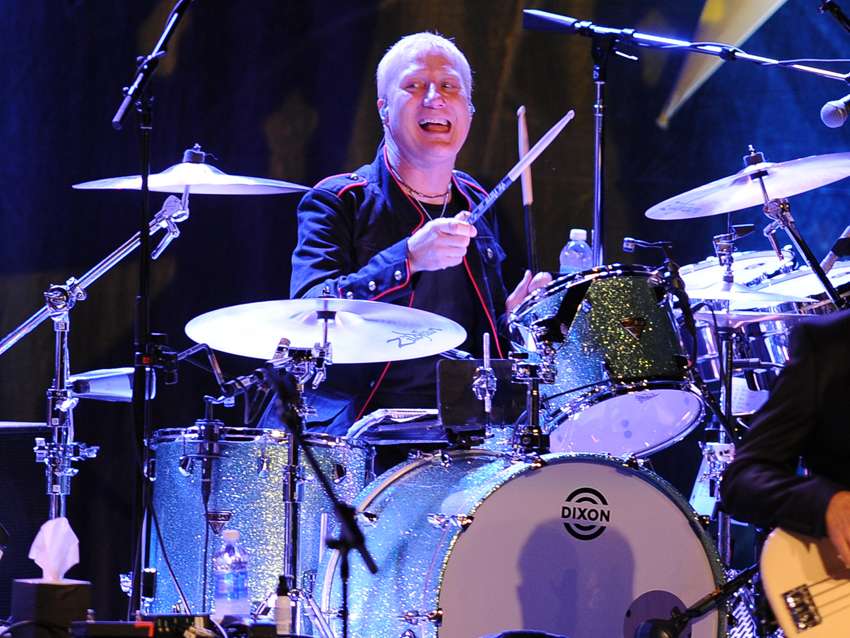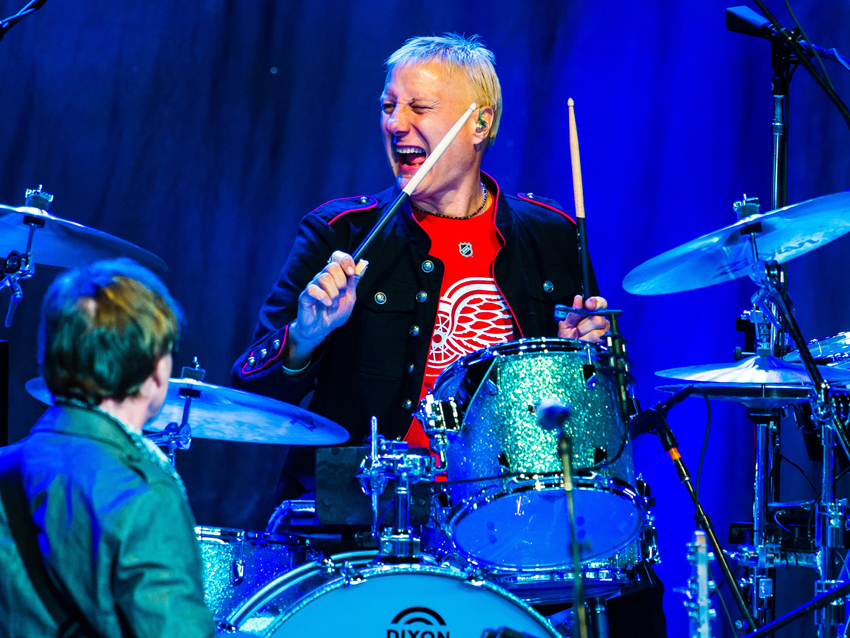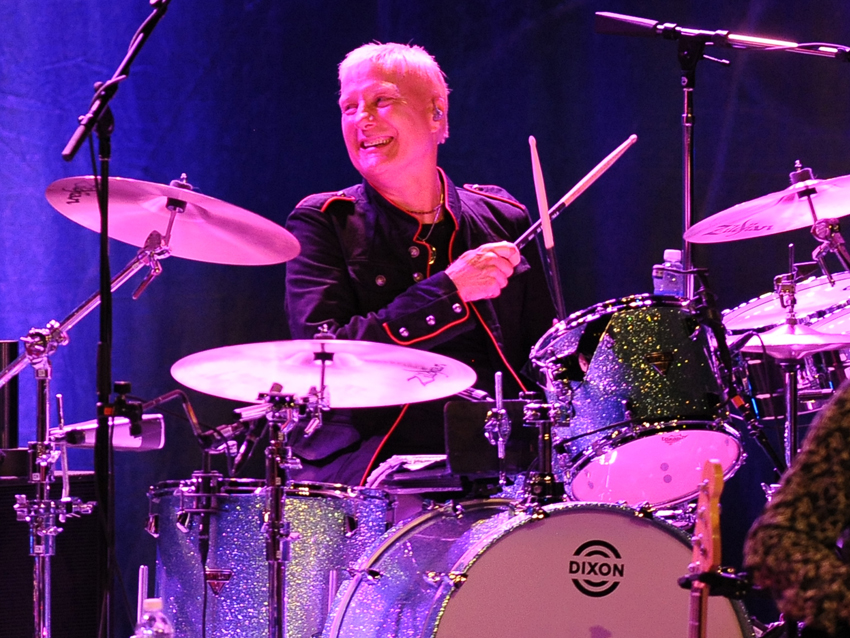
Gregg Bissonette's top 5 tips for drummers
Drumming superstar Gregg Bissonette is looking forward to the 26th Annual Guitar Center's Drum-Offs, which takes place this coming Saturday, Jan. 17, at the Club Nokia in Los Angeles, CA. The event will feature performances by drum greats Steve Jordan, Tony Royster Jr., Stephen Perkins and Animals As Leaders' Matt Garstka. Bissonette has participated in numerous Drum-Offs over the years, but this will be his first time as host for the night.
"I'm so looking forward to serving as host," Bissonette says. "I used to go to the Drum-Offs in the ‘80s, and I’ve been a judge many times. These events are always inspiring and fun. They help showcase new talent, and they really help to build the drum community in a positive way."
Drummers Jharis Yokley, Shariq Tucker, D’Andrew Gosey, Clyde Frazier and Forrest Rice will compete for the title of title of Guitar Center's Drum-Off Champion. While demonstrations of monster chops will undoubtedly be on display, Bissonette says that he's hoping to see something more than just jaw-drawing technical flash. "I want to experience people playing with heart and passion," he says. "There are different categories, like Showmanship, and in that category I'd like to see drummers really explore the essence of what that means, not just do a stick twirl here and there. And I know I will – the Drum-Offs always bring out the brilliance.”
"Brilliant" can certainly describe Bissonette's own playing over the years. During his career, he's performed with everyone from Maynard Ferguson and Larry Carlton to David Lee Roth and Joe Satriani. And since since 2008, he's had a plum gig for any Beatles fan as a regular member of Ringo Starr & His All-Starr Band. "There's just no way to describe the honor it's been to play alongside Ringo," Bissonette raves. "So much of what we do today as drummers, Ringo was pioneering that."
Bissonette is no stranger to teaching – he posts a popular series of lessons, the Gregg Bissonette Drum School, on DrumChannel.com. Asked what tips he's picked up from the legendary Fab Four sticksman, he's quick to answer: "The importance of lyrics. Ringo told me that he always asks for lyric sheets. They help him connect with the song. He keys into the vocals, so he wants to know the words. I think that's why he always plays the perfect parts for any song and why he never overplays. He's thinking about the lyrics and the vocals the whole time.”
In February, Bissonette will rejoin Starr and the All-Starr Band for a batch of dates that hits the US, the Dominican Republic, Puerto Rico, Brazil, Chile and Mexico – visit Ringo Starr's official website for more info. And be sure to pick up Bissonette's most recent album, Warning Will Robinson! (that's a Lost In Space reference), available at CD Baby and iTunes.
Fore more information on the Guitar Center Drum-Offs, visit the Guitar Center. On the following pages, Bissonette runs down his Top Five Tips for Drummers.

Be a good person
“This might sound like it doesn’t have anything to do with drumming, but it does. If you want to be a drummer in a band, or if you want to make a living playing the drums, you’ve got to be a good person. A people person. In essence, you should try to be the person that you’d want to hang out with.
“So many players who get gigs are monstrous musicians, but they’re miserable people. They complain all the time, they’re always down – whatever is going on, they only see the negative. People will only put up with that for so long. You can’t be like that. You have to be the light in the room.
“If you try to think of the positives and you lift people up, people are going to want you in their band. They’re gonna want to jam with you, or they’ll want you to play on their albums. I mean, c’mon, if somebody wants to pay you to play on their record, you’ve gotta be super grateful. I’m not saying you have to be a court jester, but you need to be a good, positive person. Lift everybody up. Treat other people the way you want them to treat you.”

Tempo
“Correct tempo is so important. You’ve got to know the how the song is supposed to be played. I’ve always got one of my in-ears plugged into a little song starter that’s over to my left. I use it to find the correct tempo to start the song.
“I like 'record tempo' when I play. Some people are different – a lot of times they want things a bit faster. But I’ve always preferred to hear things the way they were on the record. In any event, it’s vitally important to start a song at the right tempo and keep it consistent throughout.”

Try to play stylistically correct
“This is something people don’t think about a lot. If you’re going to play with a metal band, learn the song and play like a metal drummer. If you’re going to play with a bebop band, get some brushes, listen to the song, get in the vibe and play in that style.
“It’s not the drummer's job to be the square peg going onto the round hole. Don't reinvent what you don't have to. You’re supposed to fit perfectly; everything is supposed to sound great around you. You can have 20 different styles of music, and your job is to play correctly and with believability. You have to do everything you can to sound authentic with the music the whole band is playing.”

Serve the song
“People say ‘gospel chops,’ as if it’s a style. But think about it: Gospel is worship music, and what’s the most important part of worship music? Words, of course. A lot of drummers just go off and do crazy stuff and play all over the words.
“There’s this mentality that if you’re not going nuts behind the kit, then you’re not earning your money. That’s absurd. If you’re playing with Miles Davis or Joe Satriani or you name ‘em, you have to remember that those guys are playing melodies. Or if you’re backing up a singer, the vocals are the main thing. That’s it.
“If you play drums just to get fast, cool licks in, then you’re not serving the song; in fact, you’re doing the song and yourself a disservice.”

Don't forget to tune up
“This is another one that people sometimes forget about. Before a gig or a recording session, you need to make sure your drums are tuned accordingly to the style of music you’re going to play.
“Some guys show up at gigs and sessions with dented, beat-up heads. Those things don’t project – you hit ‘em and they make this ‘doonk’ sound. Nobody’s going to be able to mix you if you play dead heads. The front of house sound guys or the studio engineers won’t have anything to work with. Give 'em sound, give 'em tone – something musical.
“I use Remo heads, and they sound amazing. I can put them on my Dixon drums and tune them up, and I’m good to go. The Dixon drums have a thin maple shell, which I find works for all styles. Some darker-sounding woods aren’t as adaptable, but my Dixon drums really project.
“Whatever you choose to play, make sure the drums are tuned up. Nobody wants to hear blah drums.”
Joe is a freelance journalist who has, over the past few decades, interviewed hundreds of guitarists for Guitar World, Guitar Player, MusicRadar and Classic Rock. He is also a former editor of Guitar World, contributing writer for Guitar Aficionado and VP of A&R for Island Records. He’s an enthusiastic guitarist, but he’s nowhere near the likes of the people he interviews. Surprisingly, his skills are more suited to the drums. If you need a drummer for your Beatles tribute band, look him up.
